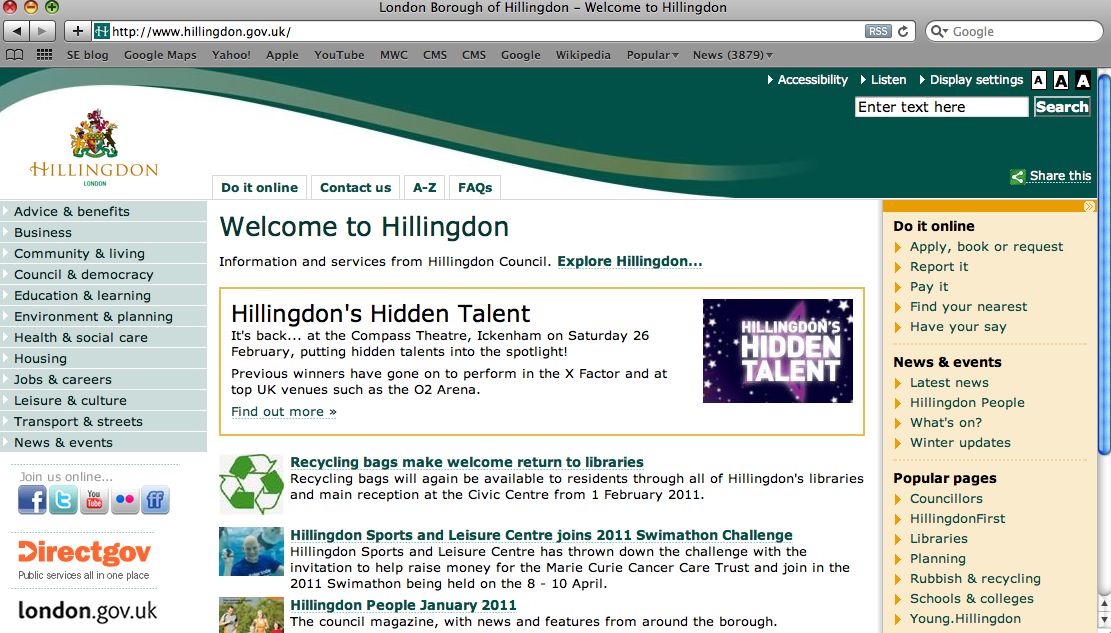Hillingdon Council showered with unexpected cloud benefits
Before the Government’s G-Cloud comes Hillingdon Council’s H-Cloud which is beginning to change the face of local government - and not just its ICT.

Hillingdon Council has had to adopt a stern approach to implementing a cloud computing-based infrastructure, the local authority said during a talk at the Cloud Expo Europe conference in London this week.
"Sometimes when your trying to deliver innovation, you're going to be disruptive," Roger Bearpark, the assistant head of ICT for Hillingdon Council, told delegates.
The introduction of new working practices sometimes means over-ruling the wishes of others, according to Bearpark.
"People want to use technology to do the same old thing in the same sort of way but just somehow do it on a computer," he said.
He explained that it is not always best to listen to the users when technology can improve tried and trusted manual processes. This is truer in a cloud infrastructure where it is easier to set up a new method of working, see if it works and, if not, tear it down, he said.
Hillingdon is at the forefront of applying new technologies to the bureaucratic world of local politics. Its pioneering approach has made the authority a role-model which other local government ICT departments look up to.
Bearpark's department has introduced the H-Cloud, a private cloud infrastructure that foreshadows the Government's more ambitious G-Cloud project.
Get the ITPro daily newsletter
Sign up today and you will receive a free copy of our Future Focus 2025 report - the leading guidance on AI, cybersecurity and other IT challenges as per 700+ senior executives
The move to a virtualised environment has had a major impact, which has over spilled from technological innovation and changed the ICT team's attitudes and working practices.
"Instead of asking what do you do on your PC?' that became irrelevant it was What do you do? How do you serve the public?'. Understanding that and understanding what suppliers can deliver allowed my IT team to become far more effective. What they were actually doing was acting as a kind of interpreter between business need and suppliers," he said.
This is has become a two-way conversation because the IT team can now explain to suppliers what is required and have changes made, rather than accepting software packages and trying to adapt them for purpose.
Although Bearpark said that sometimes innovation has to be forced on the users, he admitted that the users are being listened to more. The virtualised servers allow the authority to be much more agile when it comes to provisioning.
"If [the users] have a good idea, there is little permanent commitment if they want us to try something," Bearpark said.
In the past, other local government departments had to fund the provisioning of new hardware and software before an idea could be turned into an application. It was expensive and time-consuming, he explained. Now, these implementations can be set up within hours and little is lost if they do not work out.
Bearpark holds great hopes for the future when H-Cloud and G-Cloud meet. Heathrow Airport is on the borders of Hillingdon and there are imports that are governed by customs regulations. The council is working on an application that will make it easier to process these imported goods and check if there is a ban, health and safety issues or a tax levy.
When the application matures and G-Cloud comes on line, he said that this application can be uploaded to the Government cloud for all entry ports to the UK to use as a cloud service. This would standardise working practices and keep everyone updated on changes in regulations in a way that would have been impossible in the past.
The cloud will not only be a vehicle for innovative new services, Bearpark concluded, but will also bring efficiency by standardising processes that are currently locally implemented on an ad-hoc basis.
-
 Cleo attack victim list grows as Hertz confirms customer data stolen
Cleo attack victim list grows as Hertz confirms customer data stolenNews Hertz has confirmed it suffered a data breach as a result of the Cleo zero-day vulnerability in late 2024, with the car rental giant warning that customer data was stolen.
By Ross Kelly
-
 Lateral moves in tech: Why leaders should support employee mobility
Lateral moves in tech: Why leaders should support employee mobilityIn-depth Encouraging staff to switch roles can have long-term benefits for skills in the tech sector
By Keri Allan
-
 Starmer bets big on AI to unlock public sector savings
Starmer bets big on AI to unlock public sector savingsNews AI adoption could be a major boon for the UK and save taxpayers billions, according to prime minister Keir Starmer.
By George Fitzmaurice
-
 UK government targets ‘startup’ mindset in AI funding overhaul
UK government targets ‘startup’ mindset in AI funding overhaulNews Public sector AI funding will be overhauled in the UK in a bid to simplify processes and push more projects into development.
By George Fitzmaurice
-
 UK government signs up Anthropic to improve public services
UK government signs up Anthropic to improve public servicesNews The UK government has signed a memorandum of understanding with Anthropic to explore how the company's Claude AI assistant could be used to improve access to public services.
By Emma Woollacott
-
 The UK’s AI ambitions face one major hurdle – finding enough home-grown talent
The UK’s AI ambitions face one major hurdle – finding enough home-grown talentNews Research shows UK enterprises are struggling to fill AI roles, raising concerns over the country's ability to meet expectations in the global AI race.
By Emma Woollacott
-
 US government urged to overhaul outdated technology
US government urged to overhaul outdated technologyNews A review from the US Government Accountability Office (GAO) has found legacy technology and outdated IT systems are negatively impacting efficiency.
By George Fitzmaurice
-
 Government urged to improve tech procurement practices
Government urged to improve tech procurement practicesNews The National Audit Office highlighted wasted money and a lack of progress on major digital transformation programmes
By Emma Woollacott
-
 Government says new data bill will free up millions of hours of public sector time
Government says new data bill will free up millions of hours of public sector timeNews The UK government is proposing new data laws it says could free up millions of hours of police and NHS time every year and boost the UK economy by £10 billion.
By Emma Woollacott
-
 Online Safety Act slammed by rights groups as bill gains royal assent
Online Safety Act slammed by rights groups as bill gains royal assentNews The Online Safety Act has been described as a veiled attempt to secure access to encrypted messages
By Rory Bathgate